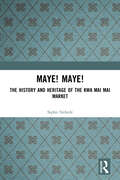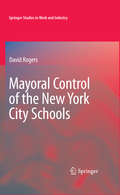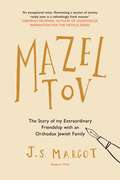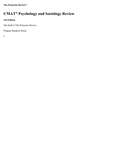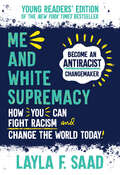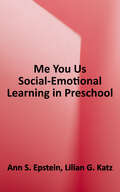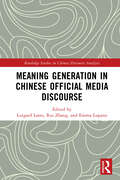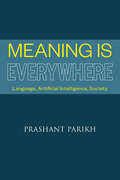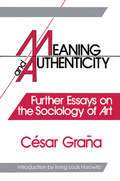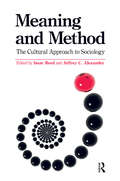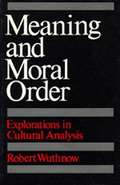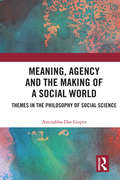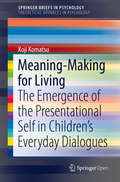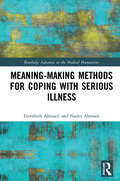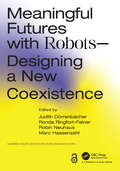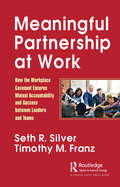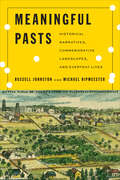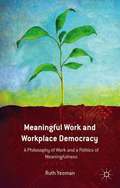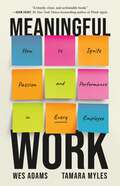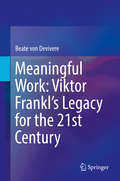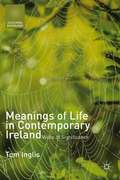- Table View
- List View
Maye! Maye!: The History and Heritage of the Kwa Mai Mai Market
by Sipho SitholeThis book presents an analysis of Johannesburg’s Kwa Mai Mai market, which was once known to regulars as 'a place of healing' and has experienced numerous changes of significant national transformation over time. It explores how the Kwa Mai Mai community, formerly a working class of migrants, reversed roles and took control of the means of production from the dominant class. Through their heightened cultural consciousness, this marginalised migrant community reimagined new economic realities and possibilities, forever distancing themselves from their painful, repressive past. This book chronicles the significance of cultural memory and discusses how it can be used as a weapon to not only resist subjugation but also to invoke entrepreneurial and creative spirit.Written out of the collective observations and interpretations of his ethnographic research spanning four years – Sipho Sithole’s ‘Maye Maye’ is dedicated to marginalised communities and those who, despite operating on the fringes of the economy, have sought to create their own fortune and destiny.Print edition not for sale in Sub Saharan Africa.
Mayoral Control of the New York City Schools
by David RogersThis book examines the political dynamics of the governance overhaul and how the management styles of Mayor Bloomberg and School Chancellor Klein affect its design and implementation in the Mayor's first term. The trend toward mayoral governance is happening in other large cities, stimulated in part by business leaders, mayors, and states concerned about how the schools contribute to declining global competitiveness and chronic social and economic problems of inner cities.
Mazel Tov: The Story Of My Extraordinary Friendship With An Orthodox Jewish Family
by J. S. MargotA heartwarming, funny and provocative memoir of a woman navigating clashing cultures during her decades-long friendship with an Orthodox Jewish family, new in paperbackWhen 20-year-old student J. S. Margot took a tutoring job in 1987, little did she know it would open up an entire world.In the family's Orthodox Jewish household she would encounter endless rules - 'never come on a Friday, never shake hands with a man' - and quirks she had not seen before: tiny tubes on the doorposts, separate fridges for meat and dairy products. Her initial response was puzzlement and occasionally anger, but as she taught the children and fiercely debated with the family, she also began to learn from them.Full of funny misunderstandings and unexpected connections, Mazel Tov is a heartwarming, provocative and disarmingly honest memoir of clashing cultures and unusual friendships - and of how, where adults build walls, sometimes only children can dissolve them.
Mcat Psychology And Sociology Review, 3rd Edition: Complete Behavioral Sciences Content Review + Practice Tests (Graduate School Test Preparation Ser.)
by The Princeton The Princeton ReviewMake sure you’re studying with the most up-to-date prep materials! Look for the newest edition of this title, The Princeton Review MCAT Psychology and Sociology Review, 4th Edition (ISBN: 9780593516225, on-sale November 2022). Publisher's Note: Products purchased from third-party sellers are not guaranteed by the publisher for quality or authenticity, and may not include access to online tests or materials included with the original product.
Me and White Supremacy: Young Readers' Edition
by Layla SaadHow do we give young people the tools they need to actively dismantle racism and create a better world for everyone? From the author of the groundbreaking NEW YORK TIMES BESTSELLER, Me and White Supremacy, Layla Saad's young readers' edition is a timely, crucial, and empowering guide for today's youth on how to be antiracist change makers.Layla Saad meticulously updated the content for young readers to include:definitions and history of various topics coveredsections to help readers process complex topicsno time limit—unlike the adult edition, this is not a 28-day challenge so readers can use this content for however long it takes to do the workcontent that is approachable and applicable for those with and without white privilegeMe and White Supremacy has reached so many adults in their journeys to become better ancestors. This edition aims to teach readers how to explore and understand racism and white supremacy and how young readers can do their part to help change the world. Covering topics such as white privilege, white fragility, racist stereotypes, cultural appropriation, and more, Layla Saad has developed a brilliant introduction and deep dive that is sure to become a standard in antiracist education."This young readers' edition empowers young people to have courageous conversations about race, power, and privilege with themselves first and then with others." -Elisabet Velasquez, author of When We Make It
Me, You, Us: Social-Emotional Learning in Preschool
by Ann S. EpsteinThe field of early childhood education has a long tradition of concern for the social and emotional development of young children. The comprehensive classical work of Susan Isaacs -- one of the early specialists in the field -- titled “Social Development in Young Children” that addressed these topics was first published in 1937.1 In more recent times it has become clear that unless a child achieves at least a minimal level of social competence by about the age of six, he or she is likely to be at risk for many social difficulties for the rest of his or her life (Parker & Asher, 1987).2 Currently, research reports appear almost daily indicating that early social relationships predict academic achievement as well as school completion and dropout rates (see Ladd et al., 2008).3 This book is a welcome, comprehensive overview of all facets of this important aspect of development. With its highly readable form and structure, it will be helpful to students as well as practitioners whose work involves them in the development of young children. The book is divided into three main sections that address emotional learning, social learning, and related concerns beyond the classroom such as cultural and community matters. Several sidebars offered throughout are especially helpful in linking the discussions of the various components of social and emotional development to promising teaching practices.
Meaning Generation in Chinese Official Media Discourse (Routledge Studies in Chinese Discourse Analysis)
by Rui Zhang Lutgard Lams Emma LupanoDrawing on approaches from Linguistic Pragmatics, Critical Discourse Analysis, Conceptual Metaphor Theory, Social Actor Representation Theory, and Framing Theory, this book critically explores the various linguistic devices and pragmatic strategies that concern meaning generation in the context of Chinese official media discourse.The volume rests on eight chapters that—using different analytical lenses, with either a culture-specific perspective or a cross-cultural one—take language analysis as their point of departure, in order to investigate how meaning is generated in situated discourse, such as media accounts about specific issues within the socio-political, cultural, or economic sphere. Each chapter is empirically grounded, and either focuses on a specific genre, such as the documentary and the press conference, or explores social and political events and initiatives that have been topical in recent years: the Covid-19 and SARS crises, the US-China trade conflict, the Regional Comprehensive Economic Partnership (RCEP), and the 2021 Hong Kong electoral system reform.By bringing back the linguistic analysis to the core of the analytical approach, the volume shows the interconnection of text and context, reminding the reader about the key role of language users both on the production and reception side.This book will be of interest to students and scholars interested in the relation between language and politics and, in particular, in understanding meaning-making and meaning-moulding processes in discourses articulated in an official Chinese context aimed both internally and internationally.
Meaning Is Everywhere: Language, Artificial Intelligence, Society
by Prashant ParikhMeaning Is Everywhere sketches a theory of meaning from the ground up—with potentially profound consequences. In a sweeping narrative that arcs from the origins of meaning through the emergence of present-day science and technology, Prashant Parikh offers a fresh perspective on some of the most significant challenges and opportunities of the contemporary world, including the promise of AI, relief from scarcity and polarization, and the possibility of at least partial utopias.
Meaning and Action: Community Planning and Conceptions of Change (Routledge Revivals)
by Peter MarrisFirst published in 1987, Meaning and Action’s central theme is the difficulty of matching an understanding of social problems to effective strategies, in a time of endemic fiscal constraints and profound changes in economic structure. Peter Marris explores the relationship between the way we conceive problems and the possibilities of action by examining two British policies – the National Community Development Project and the redevelopment of London’s dockland. Drawing on both American and British experiences and policies, Marris shows how, as community planners and organizers became disillusioned with the assumptions underlying existing policies, they searched for a more comprehensive understanding of urban social structure. At the same time, this understanding became almost impossible to translate into practicable strategies of action. The book sets this analysis into a broader framework, showing how the pressures of inflation, rising taxes and unemployment undermined a liberal conception of urban policy and the supportive context it had provided for more radical improvements. It illuminates the ideological dilemma underlying the emergence of the Thatcher and Reagan administrations and the disarray of leftwing political parties. The final chapters discuss the alternative, new conceptions of social theory that are emerging and examines how the metaphors we use to represent social reality, such as structure or reproduction, can help or hinder our ability to re-integrate meaning and action.
Meaning and Authenticity: Further Works in the Sociology of Art
by Cesar GranaThis outstanding collection of hitherto unpublished work, written over the last fifteen years of the author's life, reveals the development and maturation of his ideas about sociology and art, and specifically about the relationship between them. Grafia sees in the artistic traditions of Western society the sociological sources of our sense of cultural form, as well as cultural and intellectual meaning. He discusses theories of art and theories of artists as they have changed over time, although the book is neither a history of art nor a criticism of specific artistic works. Rather, it is a defense of the sociology of art.Grafia believes that the difficult and ambitious questions in the sociology of art are not merely questions of the proper role or status of the artist, or the recognition of art as an ornament, perhaps the supreme ornament, of our culture. He believes that what the sociologist must come to terms with is the view of art as the representation, indeed the revelation of what is most telling and pervasive in culture itself. This perspective assumes that the most serious claims made for art are in fact inseparable from the unique claims that are made about art. Art can make visible what is implicit in our lives. Art can put before us a statement of what we are but do not always recognize in oursleves. Art is the mask and mimicry through which society gestures to us its ultimate and most poignant meanings. Grafia contends that this vision of art derives from Hegelian aesthetics, and he believes that this grand view-whether one takes an idealist, a literary, or a Marxist-materialist position-also implies a dramatically changed conception of society itself.The essays cover a variety of subjects, from Marx, museums, and modern literature, to Durkheim, Daniel Bell, and bullfighting-the last being the apotheosis of cultural expression rendered into artistic form. Throughout, Grafia considers questions of the social origins of our artistic and intellectual traditions, the influence of these traditions on our ways of thinking about society, and their pervasiveness as standards for social meaning.
Meaning and Method: The Cultural Approach to Sociology
by Jeffrey C. Alexander Isaac ReedCulture is increasingly important to American social science, but in what way? This book addresses the core issues of the sociology of culture-questions about the social role of meaning, along with those about the methods sociologists use to study culture and society-in a manner that makes clear their relevance to sociology as a whole. Part I consists of essays by leading cultural sociologists on how the turn to culture has changed the sociological study of organizations, economic action, and television, and concludes with Georgina Born's methodological statement on the sociology of art and cultural production. Part II contains a highly original, and at times heated, debate between Richard Biernacki and John H. Evans on the appropriateness of abstract and quantifiable coding schemes for the sociological study of culture. Ranging from the philosophy of science to the concrete, practical problems of interpreting masses of cultural data, the debate raises the controversy over the interpretation of culture and the explanation of social action to a new level of sophistication.
Meaning and Moral Order
by Robert WuthnowGoing beyond classical, neoclassical, and poststructural theories of culture, this innovative, controversial, challenging book will compel scholars to rethink many of the assumptions on which the study of ideology, ritual, religion, science, and culture have been based.
Meaning, Agency and the Making of a Social World: Themes in the Philosophy of Social Science
by Amitabha Das GuptaThis book explores a vital but neglected element in the philosophy of social science – the complex nature of the social world. By a systematic philosophical engagement, it conceives the social world in terms of three basic concerns: epistemic, methodological and ethical. It examines how we cognize, study and ethically interact with the social world. As such, it demonstrates that a discussion of ethics is epistemically indispensable to the making of the social world. The book presents a new interpretation of philosophy of social science and addresses a series of related topics, including the role of the human subject in the context of scientific knowledge, objectivity, historicity, meaning and nature of social reality, social and literary theory, scientific methodology and fact/value dichotomy, human and collective agency and the limits to relativism. Examining each in turn, it argues that the social world is constructed through human actions and becomes significant because we ascribe meaning to it. This is organized around discussions on the meaning, agency and the making of a social world. The book will be useful to scholars and researchers of philosophy of social science, political philosophy and sociology.
Meaning, Discourse and Society
by Wolfgang TeubertMeaning, Discourse and Society investigates the construction of reality within discourse. When people talk about things such as language, the mind, globalisation or weeds, they are less discussing the outside world than objects they have created collaboratively by talking about them. Wolfgang Teubert shows that meaning cannot be found in mental concepts or neural activity, as implied by the cognitive sciences. He argues instead that meaning is negotiated and knowledge is created by symbolic interaction, thus taking language as a social, rather than a mental, phenomenon. Discourses, Teubert contends, can be viewed as collective minds, enabling the members of discourse communities to make sense of themselves and of the world around them. By taking an active stance in constructing the reality they share, people thus can take part in moulding the world in accordance with their perceived needs.
Meaning-Making for Living: The Emergence of the Presentational Self in Children’s Everyday Dialogues (SpringerBriefs in Psychology)
by Koji KomatsuThis Open Access Brief analyzes the dynamics in which children’s selves emerge through their everyday activities of meaning construction, both in their relationships with family and within school education. It begins with a discussion of new psychological inquiries into children's selves and builds upon the innovative theoretical notion of the Presentational Self, developed by the author over the last decade. The book illustrates how the observation of children’s meaning construction in their everyday lives becomes a starting point for theoretical and empirical inquiries into child development and gives a framework that promotes new inquiries in this area. The book describes the Presentational Self Theory as a sense of how the notion of the Self is being worked upon in everyday life encounters. Chapters feature in-depth analyses of exchanges between adults and children in the Japanese cultural context. Meaning-Making for Living will be of interest to researchers and graduate students in the fields of cognitive, social, developmental, educational, and cultural psychology.
Meaning-making Methods for Coping with Serious Illness (Routledge Advances in the Medical Humanities)
by Nader Ahmadi Fereshteh AhmadiThis book provides an alternative, complementary approach to the existing conventional approaches to religious and spiritually oriented coping. By focusing on the role of culture, the authors take into account the methods employed by a vast number of people who do not directly identify themselves as religious. The empirical data used in this book derive from studies conducted in several countries; Sweden, China, South Korea, Turkey and Malaysia, across which religion plays a different role in the social and cultural life of individuals. This approach and these empirical data are unique and allow comparisons to be made between different cultural settings. By introducing the concept of meaning-making coping, the authors explore the influence of culture on choice of coping methods, be they purely religious, spiritual or existential. The term "existential meaning-making coping" is used to describe coping methods that are related to existential questions; these methods include religious, spiritual and existential coping methods. Meaning-making Methods for Coping with Serious Illness contributes to new approaches and theoretical models of coping. As such it is an invaluable resource for health care, medical, public health and sociology students and researchers. It will also be of interest to educators and policy-makers working in the area of health.
Meaningful Futures with Robots: Designing a New Coexistence (Chapman & Hall/CRC Artificial Intelligence and Robotics Series)
by Marc Hassenzahl Judith Dörrenbächer Ronda Ringfort-Felner Robin NeuhausSoon, robots will leave the factories and make their way into living rooms, supermarkets, and care facilities. They will cooperate with humans in everyday life, taking on more than just practical tasks. How should they communicate with us? Do they need eyes, a screen, or arms? Should they resemble humans? Or may they enrich social situations precisely because they act so differently from humans? Meaningful Futures with Robots: Designing a New Coexistence provides insight into the opportunities and risks that arise from living with robots in the future, anchored in current research projects on everyday robotics. As well as generating ideas for robot developers and designers, it also critically discusses existing theories and methods for social robotics from different perspectives - ethical, design, artistical and technological – and presents new approaches to meaningful human-robot interaction design. Key Features: Provides insights into current research on robots from different disciplinary angles with a particular focus on a value-driven design. Includes contributions from designers, psychologists, engineers, philosophers, artists, and legal scholars, among others.
Meaningful Partnership at Work: How The Workplace Covenant Ensures Mutual Accountability and Success between Leaders and Teams
by Timothy M. Franz Seth R. SilverWhy are some work partnerships exceptional while most are not? How can we establish and sustain an enhanced level of cohesion, connection, and collaboration in the most important work relationship, the one between a manager and team? What could remedy the high levels of isolation and anxiety so many feel at work these days? Silver and Franz explore the concept of ‘meaningful partnership’ in the workplace. They present meaningful partnership as a mindset where both leaders and their teams are fully committed to ensuring the support and success of the other. Then, they describe a model called ERTAP, which stands for Empathy, Respect, Trust, Alignment, and Partnership, which is the foundation for meaningful partnership. Finally, they detail a practical yet transformative relationship-building process referred to as the Workplace Covenant. This enables leaders and teams to create mutual commitments with obligatory weight that help them to feel accountable for the success of the relationship and each other. The book includes real client stories that illustrate the dimensions of partnership and the Workplace Covenant process. Silver and Franz also outline other work relationships that can benefit from meaningful partnership, pitfalls to avoid, relevant research, and insights derived from years of consulting experience. This book is a must-read for leaders interested in a better working relationship with their team; for teams who have critical work partnerships with other teams; for individuals who work closely with other individuals and need an exceptional 1:1 partnership; and finally for third-party experts in HR or continuous improvement who are seeking a new powerful way to help clients feel supported and be more successful.
Meaningful Partnership at Work: How The Workplace Covenant Ensures Mutual Accountability and Success between Leaders and Teams
by Seth Silver Timothy FranzWhy are some work partnerships exceptional while most are not? How can we establish and sustain an enhanced level of cohesion, connection, and collaboration in the most important work relationship, the one between a manager and team? What could remedy the high levels of isolation and anxiety so many feel at work these days? Silver and Franz explore the concept of ‘meaningful partnership’ in the workplace. They present meaningful partnership as a mindset where both leaders and their teams are fully committed to ensuring the support and success of the other. Then, they describe a model called ERTAP, which stands for Empathy, Respect, Trust, Alignment, and Partnership, which is the foundation for meaningful partnership. Finally, they detail a practical yet transformative relationship-building process referred to as the Workplace Covenant. This enables leaders and teams to create mutual commitments with obligatory weight that help them to feel accountable for the success of the relationship and each other.The book includes real client stories that illustrate the dimensions of partnership and the Workplace Covenant process. Silver and Franz also outline other work relationships that can benefit from meaningful partnership, pitfalls to avoid, relevant research, and insights derived from years of consulting experience. This book is a must-read for leaders interested in a better working relationship with their team; for teams who have critical work partnerships with other teams; for individuals who work closely with other individuals and need an exceptional 1:1 partnership; and finally for third-party experts in HR or continuous improvement who are seeking a new powerful way to help clients feel supported and be more successful.
Meaningful Pasts: Historical Narratives, Commemorative Landscapes, and Everyday Lives
by Russell Johnston Michael RipmeesterIn Meaningful Pasts, Russell Johnston and Michael Ripmeester explore two strands of identity-making among residents of the Niagara region in Ontario, Canada. First, they describe the region’s official narratives, most of which celebrate the achievements of white settlers with a mix of storytelling, rituals, and monuments. Despite their presence in local lore and landmarks, these official narratives did not resonate with the nearly one thousand residents who participated in five surveys conducted over eleven years. Instead, participants drew on contemporary people, places, and events. Second, the authors explore the emergence of Niagara’s wine industry as a heritage narrative. The book shares how the survey participants embraced the industry as a local identifier and indicates how the industry’s efforts have rekindled the residents’ interest in agriculture as a significant element of regional heritage and local identities. Revealing how the profiles of local narratives and commemorations become entwined with social, cultural, economic, and political power, Meaningful Pasts illuminates the fact that local narratives retain their relevance only if residents find them meaningful in their day-to-day lives.
Meaningful Philanthropy: The Person Behind the Giving
by Adrian Sargeant Jen ShangWith unparalleled access to some of the world’s most reflective and thoughtful philanthropists, this book explores the philanthropic journeys of 48 high net worth individuals (HNWIs) and ultra-high net worth individuals (UHNWIs) to uncover the person behind the giving. Their stories reveal the difference between the meaning they experience and the impact their philanthropy makes. Through the lens of philanthropic psychology, the authors examine how philanthropists experience their giving and the psychological challenges they need to overcome. This fascinating book provides a unique guide for new and experienced philanthropists and their trusted advisers and fundraisers in the creation of more meaningful philanthropic experiences.
Meaningful Work and Workplace Democracy
by Ruth YeomanMeaningful Work and Workplace Democracy is a timely revival of the social and political importance of meaningful work. Drawing upon moral philosophy, political theory and sociology of work, this book creates a philosophy of work based upon the value of meaningfulness, and addresses contemporary concerns that work has become irretrievably degraded by evaluating how this understanding of meaningfulness remedies alienation, domination and distorted social recognition. In order to retrieve the emancipatory potential of all kind of work, this book argues for the institution of a new politics of meaningfulness through a system of workplace democracy which combines democratic authority with participatory practices, concluding that making work meaningful is both the legitimate and achievable object of political and social action.
Meaningful Work: How to Ignite Passion and Performance in Every Employee
by Tamara Myles Wes Adams&“A timely, clear, and actionable book&” (Adam Grant) that makes the powerful case that meaning at work drives employee well-being, high performance, and even profit We&’re in the middle of the most significant transformation in work in over a century. Whether it&’s remote work, the rise of burnout and &“quiet quitting,&” or the changing values and priorities of employees, leading an organization has never been more complex. But through all this, a single factor remains the core driver of fulfilled, high-performing teams—their belief that their work has meaning. In Meaningful Work, Wes Adams and Tamara Myles, advisers to some of the world&’s most successful companies, leverage the science of positive psychology to show leaders why and how to make meaning the cornerstone of leadership practice. It is a practical playbook based on decades of research, including their own groundbreaking multi-year study of meaning at work, and stories from leaders you already admire and others that will surprise and inspire you. The book reveals that high engagement, happiness, productivity, and financial performance from employees are all outcomes of helping them find meaning at work. And that every job can be meaningful when leaders create a workplace culture that focuses on the three Cs: Community, Contribution, and Challenge. Whether you lead a team of call center workers, care professionals, cycling instructors, or corporate executives, this book will show you how to take small actions each day to inspire passion and performance in every employee.
Meaningful Work: Viktor Frankl’s Legacy for the 21st Century
by Beate Von DevivereThis book offers meaningful work as one of the most relevant issues for 21st century workplaces, and organizations seeking to develop leadership and drive positive change. It uses Viktor Frankl’s legacy as a scientific and philosophical pioneer, while combining cutting edge research findings from the behavioural sciences, organizational and management research, and human resource development with outstanding examples of new work approaches of leadership from around the globe. In order to respond to 21st century demands on meaningful work, this book harnesses the power of living meaning, values, purpose and compassion in workplaces. Beate von Devivere shows managers, human resources experts, consultants, coaches, medical experts, students and counsellors as well as all dedicated individuals, how to find meaning in their organizations, their teams and individual functions and challenges, bringing Viktor Frankl’s approach to today’s workplaces. Integrating a wide range of knowledge and expertise, this book covers organizational development, management practice, and findings from psychology, neuroscience as well as therapeutic approaches and new work concepts. Meaningful work is promoting an integrated approach for the ‘Copernican turn’, further promoting meaningful work, purpose and a good life.
Meanings Of Life In Contemporary Ireland
by Tom InglisThe struggle to create and sustain meaning in our everyday lives is fought using cultural ingredients to spin the webs of meaning that keep us going. To help reveal the complexity and intricacy of the webs of meaning in which they are suspended, Tom Inglis interviewed one-hundred people in their native home of Ireland to discover what was most important and meaningful for them in their lives. Inglis believes language is a medium: there is never an exact correspondence between what is said and what is felt and understood. Using a variety of theoretical lenses developed within sociology and anthropology, Inglis places their lives within the context of Ireland's social and cultural transformations, and of longer-term processes of change such as increased globalisation, individualisation, and informalisation.
